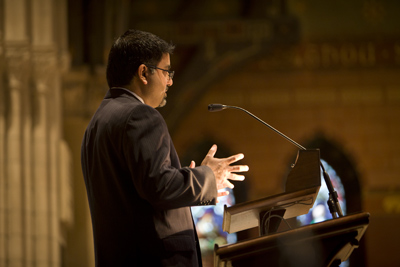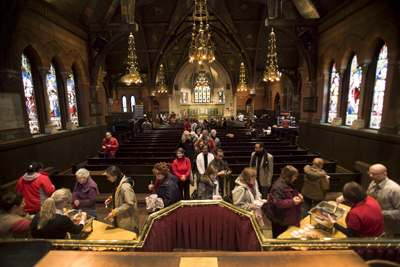Syed Rehman advocates respect for all religions
By Nancy Doolittle

Syed Rehman, a Muslim who grew up in Pakistan and Saudi Arabia, is the Web developer at Cornell's Laboratory of Ornithology, while his partner, Manda, is the associate pastor at the First Congregational Church in Ithaca. At Soup and Hope Feb. 16 in Sage Chapel, Rehman spoke of how he learned to navigate among the differences between Islam and Christianity and to be respectful of all religions.
He recalled, for example, when he was 10 or 11 and playing a version of good guys and bad guys with friends. When his mom asked what were they doing, "we proudly told her that we were making fun of Hindu gods because they are inferior to our God." When she asked how many prophets God had sent to earth, the boys answered "without even thinking -- 124,000. So she then asked us if we knew the names of all 124,000 prophets. We all looked at each other and said 'no.' She then asked us, 'Do you know for sure that none of these 124,000 was one of the Hindu gods?'"

In another instance, he said, his father taught him how to "explore and never feel out of place in any setting." While at college in Mississippi, he said, he attended services at a Presbyterian church and visited the mosque weekly, and realized he could not agree with everything taught in either place.
That prompted him to read the Quran in the original Arabic text and the sayings of the Prophet Muhammad, along with their historical contexts. "I learned that if I could logically and historically understand some rule, it made a lot more sense to me," he said, noting that people of all faiths struggle to sort out how their scriptural and historical teachings may or may not apply to their own lives.
Rehman met Manda in Dallas while she was attending the Brite Divinity School at Texas Christian University. She had been looking for a Muslim person to speak at her church in Fort Worth. They subsequently discovered that their spiritual journeys were similar and that they could each learn more about their own beliefs by learning about the beliefs of the other.
That conviction grew when Rehman studied the stories of Ishmael, Isaac and Abraham, recounted in both the Hebrew Bible and the Quran, but with significant differences. As he learned more about the story of Abraham's family in the Hebrew Bible, he gained new insights into the story from the Quran and Islamic tradition. And when he shared his experience of going on hajj, or pilgrimage, with Manda's church, that congregation learned new things about their faith tradition, Rehman said.
"When we listen with an open heart and curious mind to another's story of their faith journey, we may well find that we learn new things about ourselves, and that our own sense of faith and spirituality is not threatened, but deepened," Rehman said. "Acceptance of one doesn't exclude all others."
Media Contact
Get Cornell news delivered right to your inbox.
Subscribe